Chickens and gardens are integral parts of a thriving homestead.
Planting different plant varieties near your coop greatly benefit your chickens.
Certain herbs help to prohibit parasites, and others help cut down on the signature odor of the coop.
Fostering a diverse garden also helps satisfy our chickens’ nutritional needs, leading to more delicious eggs and higher quality fertilizer.
Chicken feed often lacks the diversity needed for an optimal nutritional profile.
Supplementing meal time with added plants for your chickens is a great way to have a healthy and happy flock.
Fostering a diverse garden of beneficial chicken-friendly plants helps your chickens thrive.
If you are interested in incorporating more chicken-friendly plants near your coop, you’ll want to pick the most beneficial plants.
We’ll guide you through 12 great plants to grow for chickens.
Table of Contents
ToggleSage
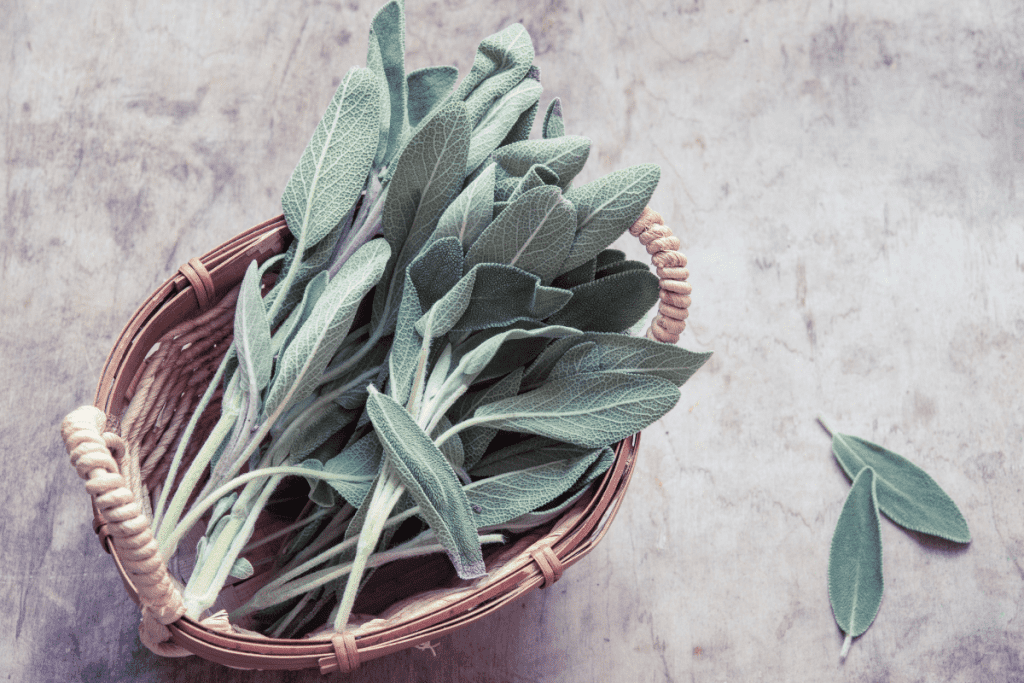
Sage is a fantastic plant to grow near chicken coops.
Not only does the lovely fragrance help mask odors, but the perennial plant is also a very nice visual addition to your garden.
The potent herb possesses antioxidant properties helpful in preventing diseases like salmonella from affecting your flock.
Sage is a beautiful plant to grow and easy for beginner gardens.
Planting sage around your coop allows the chickens to peck at the leaves, giving them great stimulation and entertainment.
If you are unable to successfully grow the sage plant, tossing sage leaves into the coop in addition to the feed is highly recommended by many seasoned chicken keepers.
Rosemary
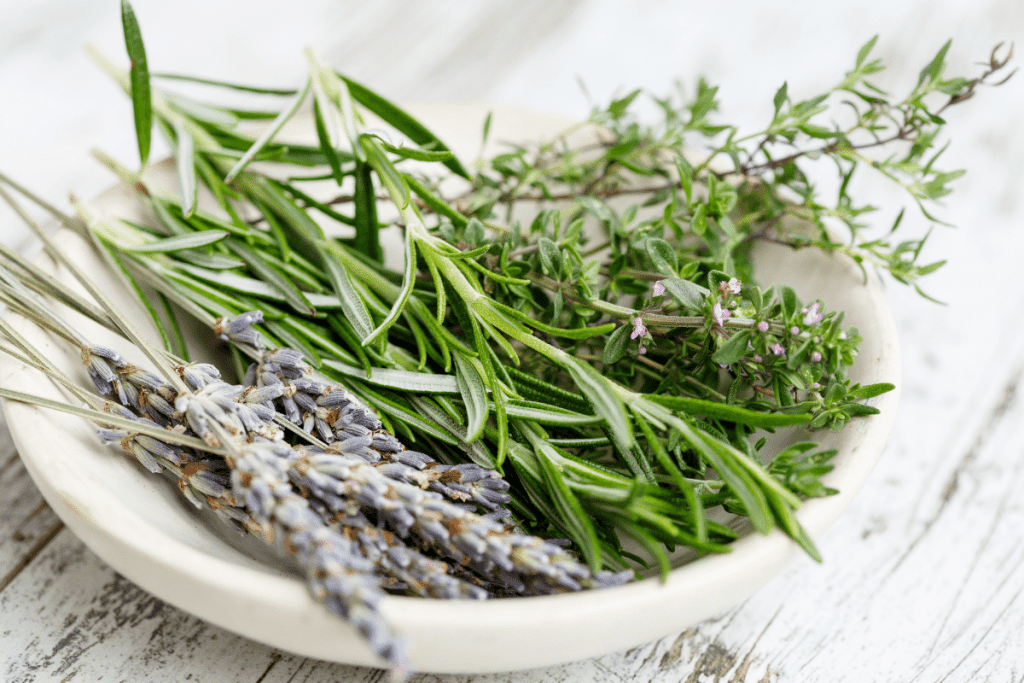
Rosemary is a hearty and wonderfully fragrant plant.
We love to use it in cooking, but did you know it hosts a myriad of beneficial properties?
One of the most notable properties of the rosemary plant is its ability to deter pests.
Many natural flea and tick shampoos and sprays include rosemary for effectiveness.
The hearty plant grows well in various climates and is very easy to maintain, making it an excellent choice for your chicken garden.
Rosemary also possesses medicinal properties for improving respiratory health in chickens.
The needle-like leaves are especially fun for chickens to peck at and forage.
The aromatic scent doubles as a pest deterrent and helps to mask the odor from your chicken coop.
Rosemary is often celebrated for its ability to keep unwanted insects away.
Thyme
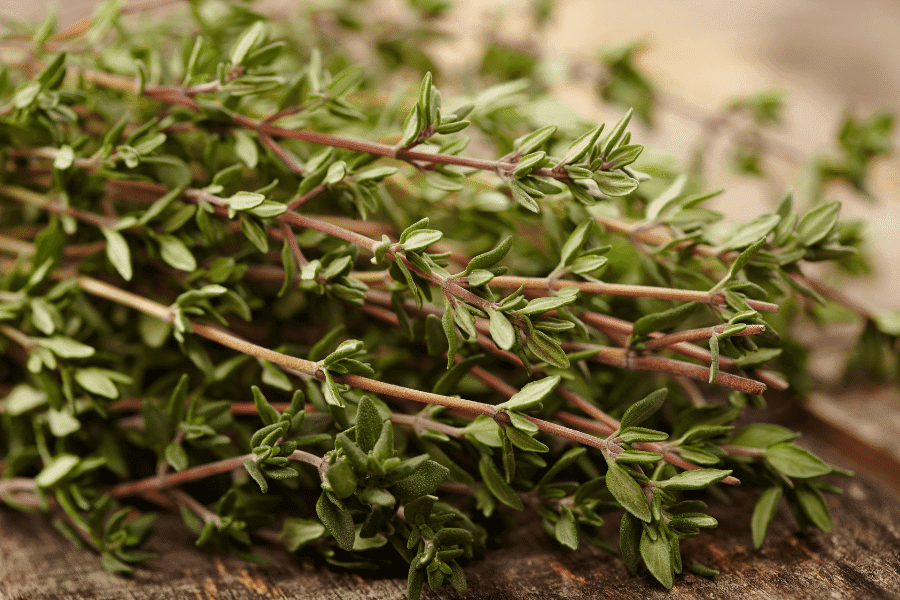
Thyme is another common herb we find in our favorite savory recipes.
The herb is easy to grow and smells wonderful.
It also possesses antibacterial properties making it an excellent addition to your garden.
The impressive herb has antibiotic properties as well.
Thyme is truly a fantastic herb for boosting the overall health of your chickens.
Like rosemary, it is also capable of improving respiratory health in your flock.
The perennial herb also blossoms tiny white flowers, making it a very aesthetically pleasing plant to incorporate around your chicken run.
Your chickens will undoubtedly enjoy the process of pecking at and foraging from the thyme plant while also improving their health and well-being.
Another plus of this herb it’s added ability to deter unwanted pests from the garden.
White Clover
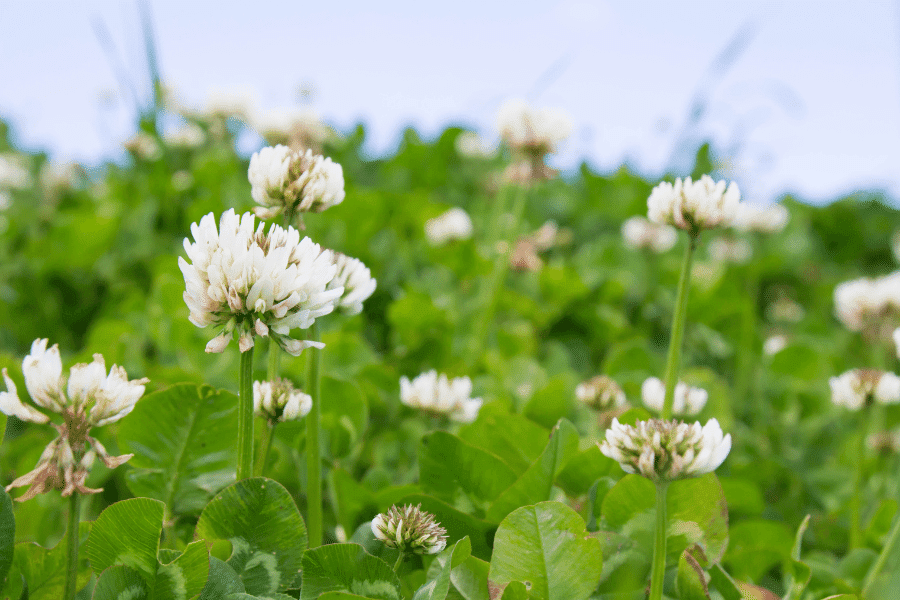
Chances are you’ve seen the small white flowers from the white clover plant popping up all over lawns and meadows in the springtime.
While many lawn care enthusiasts consider white clover a weed and annoying pest, it’s a fantastic addition to your chicken yard.
Not only is it resilient and hardy against the continuous pacing of chickens, but it also hosts a variety of benefits for your flock.
White clover is an excellent choice for ground cover in and near chicken runs.
It’s able to withstand high traffic areas.
The plant itself is high in protein and makes an excellent addition to your chicken’s feed.
Many chicken keepers consider white clover one of the best ground cover plants to establish for your flock.
Melons
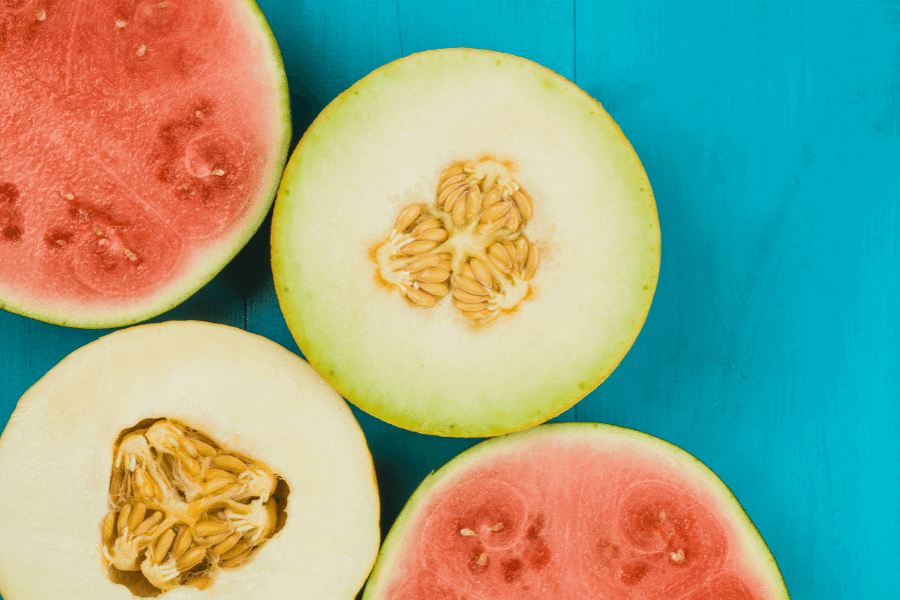
Toss it into your chicken coop next time you have leftover watermelon or cantaloupe.
You’ll quickly see how much chickens love to peck and scratch at melons until nothing is left.
Growing melons is a great way to grow fruit for you and your flock.
Melons tend to be ready for harvest in the summer, which is excellent for your chickens.
Giving melons to your flock during the hot heat of the summer months provides a boost of delicious hydration and vitamins.
We recommend growing watermelon.
Chickens will love eating the fruit in its entirety, including the rinds and seeds.
You and your family also will enjoy the sweet delicious melon on hot summer days.
Make sure to crack the fruit open for your chickens before tossing it to them.
This helps them get started in devouring the fruits.
In addition to watermelons, consider also planting honeydew and cantaloupe plants.
Your chickens will surely thank you.
Sunflowers
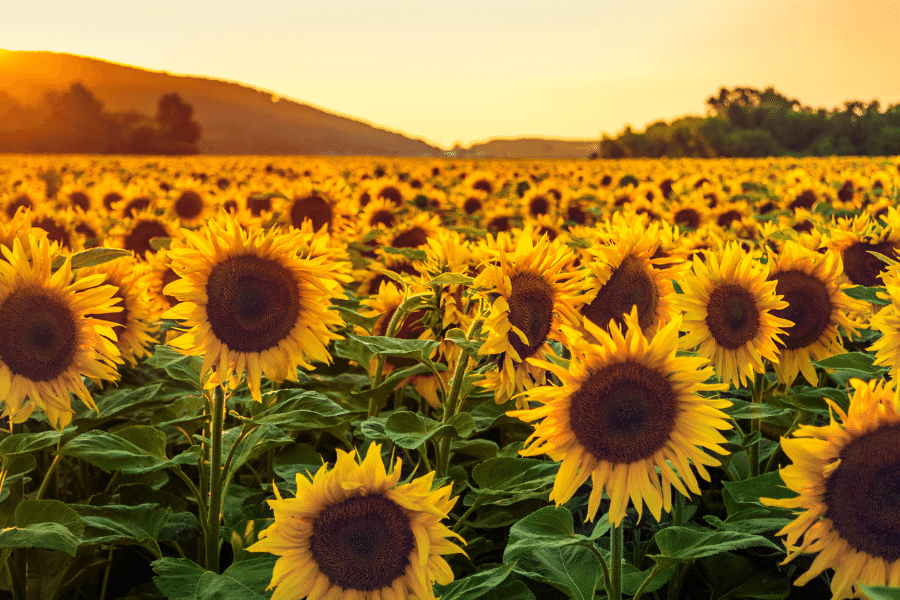
Sunflowers are beautiful and iconic plants with radiant blooms.
They are also plants to grow for chickens.
Chickens love to munch on the tasty and hearty seeds produced by the flower.
We recommend waiting until your sunflowers reach a height of 2′ feet to give them a chance to gain the strength to withstand the pecks of your flock.
Many gardeners find success by growing the sunflowers away from the chickens and just giving them the flower heads once they’ve reached their peak blooming period.
This gives the sunflowers a chance to grow large heads filled with sunflowers.
Once the sunflower begins to wilt, chop off the seed-filled bloom and toss it to your chickens.
Your flock will undoubtedly be very happy and entertained while they peck and scratch the sunflower seeds from the bloom.
Some people grow the sunflowers just out of the reach of pecking beaks to provide some shade over the coop while they grow.
Sunflowers are a fun snack for chickens and help boost their nutritional profile.
Dried sunflower seeds are also an excellent source of omega-3s, protein, and healthy fats.
Comfrey
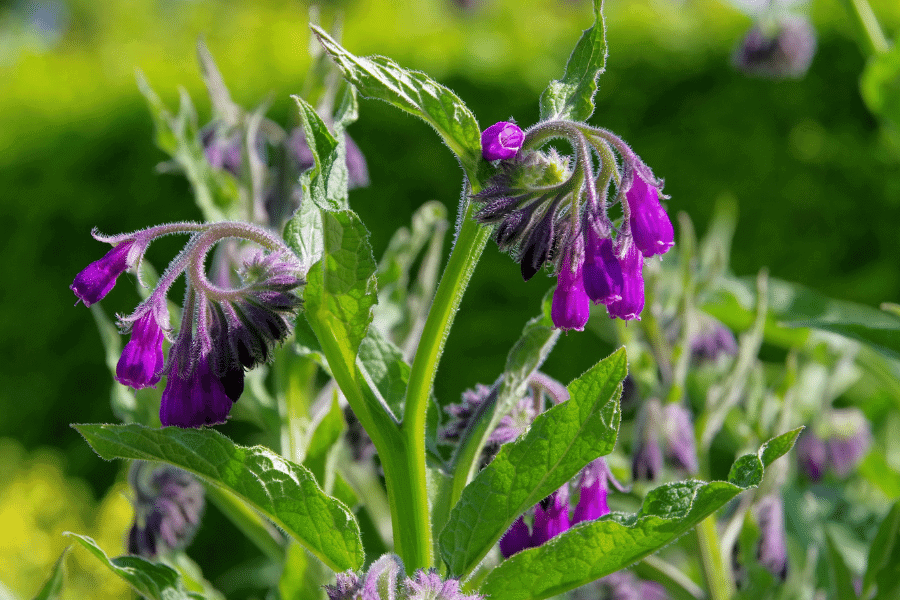
Comfrey is an easy-to-grow herb with many benefits for chickens especially laying hens.
The plant is rich in calcium, protein, and potassium.
Planting comfrey for your chickens gives them an added boost of vital minerals and vitamins.
Often chicken feed lacks the diversity of a fresh garden when it comes to nutrition.
While quality chicken feed is very important, providing diversity with herbs like comfrey into your chickens’ meals is equally vital.
Comfrey is beneficial to the overall health of chickens and helps with egg-laying.
Many chicken keepers grow comfrey to promote healthy laying among their hens.
Nasturtium
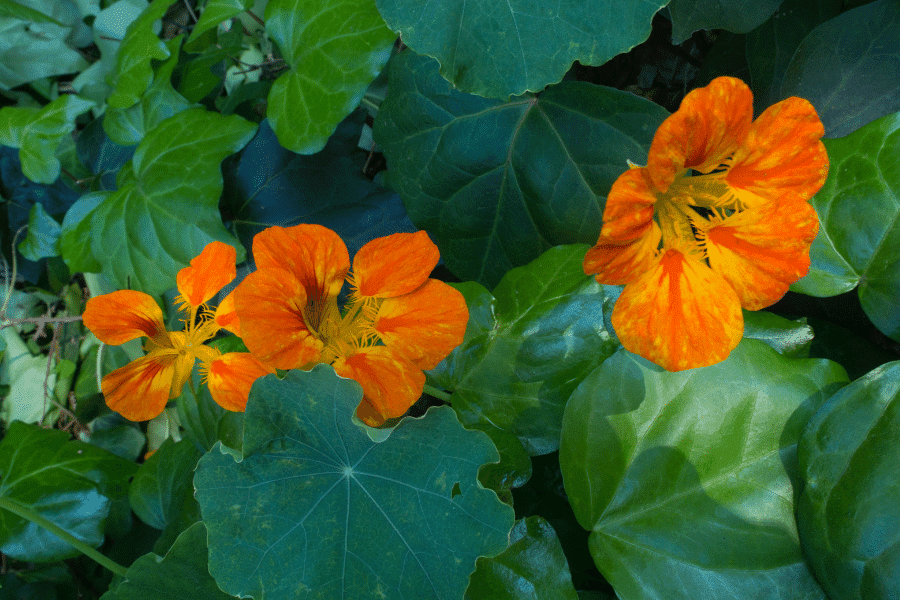
Nasturtium is another highly esteemed plant to grow for chickens.
Many chicken keepers plant this flowering plant in and near the chicken yard to take advantage of its many benefits.
The plant boasts antibiotic and antibacterial properties to boost overall health.
The seeds are also used as a natural method for de-worming chickens.
Nasturtium is a great plant to grow for your chickens if they frequently get worm infestations.
Chickens tend to be prone to worms because they constantly peck at and scratch the ground.
They love to eat insects, which sometimes leads to a problem with internal worms.
Allowing our flocks to peck at this very chicken-friendly plant helps to remove internal parasites and prevent illness and disease.
Nasturtium also tends to ward off unwanted pests and insects.
Another benefit of the plant is its beautiful red blooms.
The pop of color makes your garden look beautiful.
We highly recommend planting Nasturtium around the perimeter of chicken runs and coops to get the most from this extremely beneficial plant.
Lavender
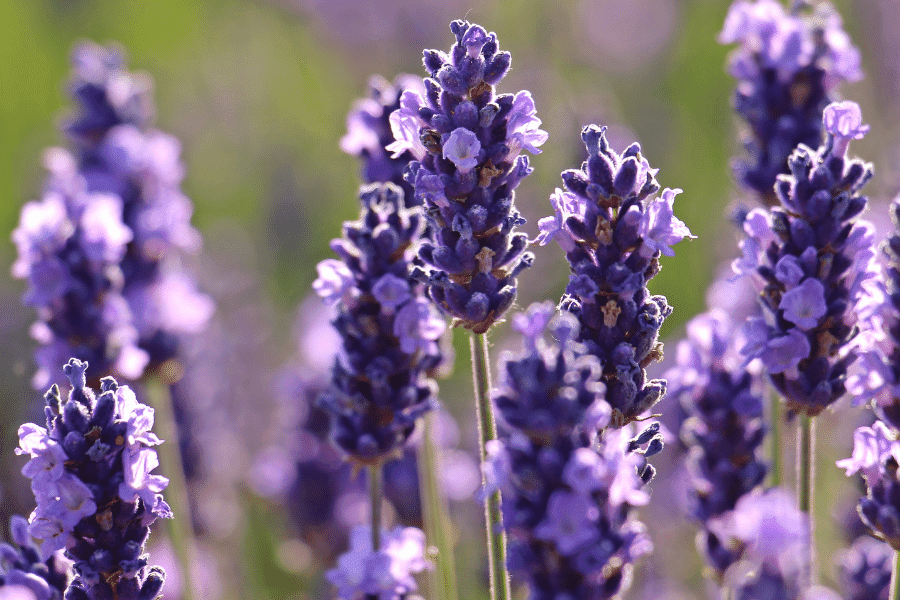
Lavender is one of my favorite herbs.
Its aroma is truly amazing and is known to help increase a sense of calm and relaxation.
We feel this when we smell the flowering herb or drink lavender tea.
Did you know chickens also feel the calming effects of the lavender plant?
Lavender plants produce highly fragrant flowers also helpful in masking the odor produced by your flock.
The plant is also helpful in repelling insects.
Lavender is another great plant to line the perimeter of chicken runs and coops to help the overall smell while deterring unwanted insects and pests.
You’ll undoubtedly enjoy smelling the fragrant flowers while enjoying their relaxing and calming effects.
Mint
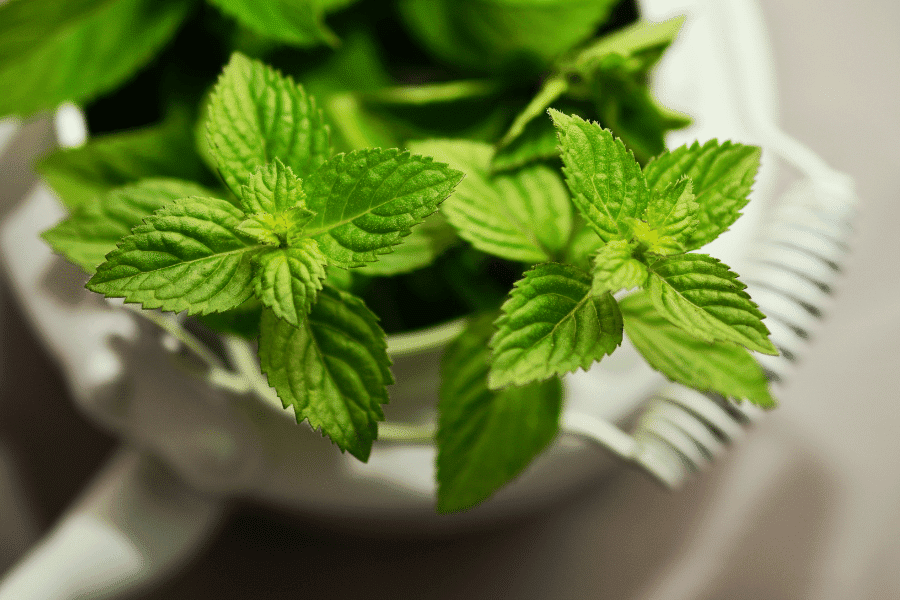
Mint is a hearty and durable plant and an excellent choice to grow for your chickens.
The smell of mint varieties tends to deter rodents and insects.
Insects and rodents sometimes carry disease and harmful bacteria into your chicken coop.
We want to keep our flock safe, and part of safety includes protecting them from rodents and insects.
Rodents also contaminate food supplies with feces and urine making mint a powerful ally in keeping them away from our coops.
Mint is also a great and tasty treat for chickens to forage and eat.
We should note the invasive tendencies of mint plants.
Many gardeners keep mints in pots to prevent a total takeover by the plant.
Popular mint varieties to grow for chickens include:
- Catnip
- Peppermint
- Spearmint
These three varieties help with repelling insects and are edible for chickens.
Garlic
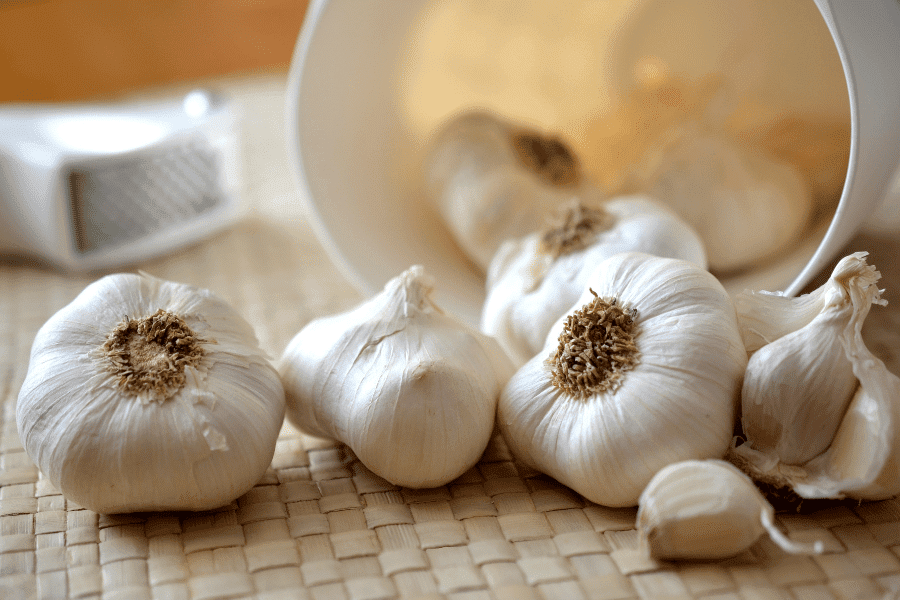
Many chicken keepers argue garlic is one of the best plants to grow for chickens.
Garlic hosts a myriad of health benefits for humans and chickens alike, making it an excellent addition to your garden.
It is also a delicious ingredient in many flavorful recipes for us.
Garlic is an excellent immune booster for us and our chickens.
The bulbs are also incredibly helpful at removing internal and external parasites.
Growing garlic allows you to throw the entire plant in for the chickens.
Bulb, stalk, and all.
Chickens love to peck and scratch at the entire plant allowing them to get health benefits.
Garlic takes a while to mature, so make sure to keep your flock away from the plants until they’ve had a chance to grow strong.
Otherwise, your chickens may kill the plant before it reaches harvest time.
Corn
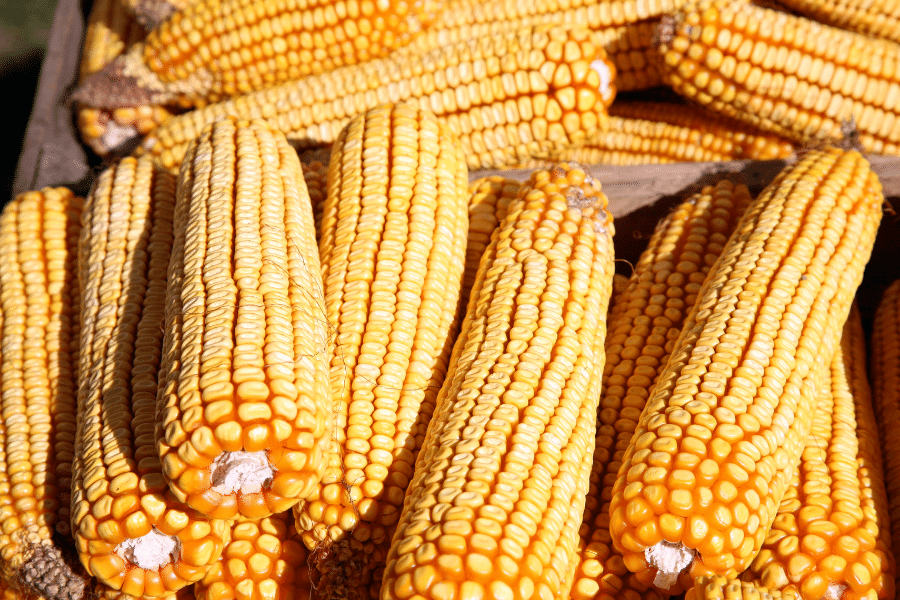
Last but not least, corn is on our list of 12 great plants to grow for chickens.
The vegetable provides quality entertainment for chickens as they peck out and enjoy the delicious kernels.
Corn plants also provide shade covering if planting near enough to the coop.
We recommend adding a few rows of sweet corn to your garden to provide an added nutritious treat to your flocks’ meals.
Many chicken feeds include corn as the top ingredient, so growing it yourself helps to provide fresh ingredients for them to enjoy.
Why Grow A Garden For Your Chickens?
We all want our flocks to thrive and be as healthy as possible.
Some chicken keepers limit food to chicken feed leaving their flock struggling to get adequate nutrients.
Happy and healthy chickens produce the best eggs.
They also produce better fertilizer which helps grow other plants.
Chances are, if you are limiting your chickens’ meals to just their feed, they’re going to show some signs of nutrient deficiency.
In many ways, gardens and chickens have a symbiotic relationship of nurturing each other.
Cut Down On Parasites
Certain plants have properties capable of protecting our chickens against internal parasites.
If you’ve ever sat and watched your chickens, you’ve undoubtedly noticed their incessant pecking and scratching at the ground.
Since chickens love to forage, planting beneficial herbs around their coop gives them access to chicken-friendly plants.
Boost Immune System and Health
Many herbs possess immune-boosting properties.
Incorporating them into your garden helps aid in the proper function of your chickens’ immune systems.
Certain herbs help to prevent certain diseases and infections like salmonella.
We recommend incorporating herbs into your chicken’s garden and allowing them to forage through the herbs to boost their immunity against harmful and deadly diseases.
More Delicious Eggs
One of the most noticeable differences in diversifying your chicken’s diet is the improved quality of their eggs.
Allowing laying hens to forage through a variety of different plants in addition to their normal feed helps them lay heartier and more delicious eggs.
Even if you are new to chickens, you’ve probably noticed the taste difference between traditional eggs and those from free-range chickens.
The eggs tend to have more flavor.
The vitamins and added nutrients from the garden contribute to the chicken’s physical health, and the act of foraging and experiencing different tastes often makes for happier chickens.
Many farmers adhere to the motto of happier chickens laying better eggs.
If you want meat on top of eggs, be sure to check out our list of the best meat chicken breeds.
Masks Odors From The Coop
Planting fragrant herbs and plants help to mask the infamous odor from the coop.
Herbs like rosemary, mint, lavender, and thyme produce potent aromas.
Chances are you’d rather be smelling flowering herbs than your chickens, so we recommend planting some of the more fragrant plant varieties around the borders of the coop.
Many of those fragrant plants help to repel insects and rodents as another bonus.
If you have neighbors nearby, they will undoubtedly also appreciate the flowering scent over the chicken coop odor.
Higher-Quality Fertilizer
Chickens provide an integral part of the gardening cycle and system in permaculture designs.
Chicken poop is an excellent fertilizer.
Providing a garden for your chickens increases the quality of their poop and creates an all-around better fertilizer for your garden.
Allowing your chickens to roam the garden increases the likelihood of their potent droppings landing and boosting the overall growth.
In many ways, the chickens and gardens help each other thrive.
Further reading: Everything you want to know about chicken poop.
Plants To Avoid Growing Near Chickens
We highly recommend incorporating a garden around your coop for your chickens, but there are quite a few harmful plants you want to be mindful of.
For the most part, chickens are fairly instinctual about what they can and cannot eat, but it’s best not to tempt fate with toxic plants in or near your chicken run.
Foraging chickens are happy chickens, but we want to keep their areas safe and free of toxic plants.
Here is a list of common toxic plants to keep away from your chicken yard:
- Nightshades like tomatoes, potatoes, eggplants
- Eucalyptus
- Jasmine
- Hydrangea
- Morning Glory
- Iris
- Ivy
- Wisteria
- Philodendron
- Rhododendron
- Daffodils
- Tulips
Many of these plants are common in our gardens.
It’s beneficial to provide a barrier to keep chickens away from these toxic plants.
It’s always better to be safe than sorry.
If you love some of these plants, we recommend having a separate garden for your chickens and establishing a chicken yard away from the gardens containing these plants.
Fostering Good Foraging Behaviour
One thing you’ve probably noticed about your chickens is their tendency to be very opportunistic.
They’ll take it upon themselves to scratch and peck wherever they can in search of a delicious grub or tasty plant.
We want our chickens to forage on the beneficial plants, but this often leads to undesirable behavior.
Chances are, your chickens aren’t going to understand where they can and cannot forage.
They will survey any areas for food opportunities.
This is why it is very important to foster good foraging behavior for your chickens.
Grow Separate Beds
One of the best ways to foster good foraging behavior is to grow separate beds.
Growing a special garden bed just for your chickens makes it a lot easier to establish boundaries and keep foraging limited to a specific and designated area.
Another benefit of growing separate beds is the ability to grow beneficial herbs with the intention of your chickens’ foraging.
This helps you and your chickens get the most out of their garden and food sources.
Growing a separate garden bed for your enjoyment will also help you to establish boundaries and keep chickens out of your garden.
This is a great idea if you grow any of the plants toxic to chickens like tomatoes, jasmine, or morning glory.
Establish Boundaries With Fences
If you already have established gardens and want to control where your chickens are pecking and scratching up dirt, fences are the most straightforward answer.
Fences establish physical boundaries to keep chickens out of certain areas.
Fences around intentional chicken gardens lush with beneficial herbs encourage your flock to eat only the health-promoting herbs and plants you’ve grown for them.
When building a fence for your chickens, it is very important to consider height.
While chickens can’t necessarily fly, they are capable of getting quite a bit of air when they want to.
Use fencing at least 6′ feet tall and make it sturdy with braces.
Chickens will attempt to perch on the fence, so make sure the fence is strong enough to withstand their attempts.
Chicken netting like this provides height and sturdiness to keep chickens in or out of whatever areas you need fencing.
Nearby neighbors will also appreciate the tall fence as it will prohibit the chickens from wandering onto their properties and foraging through their gardens.
Other Beneficial Plants To Grow For Chickens
Feeling ready to plant a food forest for your chickens?
It’s exciting to plant herbs and vegetables for your chickens, and planning it out is also a lot of fun.
Luckily, chickens are not picky eaters when it comes to plants, herbs, and vegetables.
Here are some more chicken-friendly plants to consider growing for your flock to boost their nutritional profile, deter pests, and boost immunity and overall health:
- Squash
- Cucumbers
- Amaranth
- Snap Peas
- Fennel
- Oregano
- Wormwood
It’s often best to keep food plants away from chickens until they reach maturity.
Oftentimes your flock will kill the plants before they’ve even had a chance to produce fruit.
We recommend keeping food plants in a separate bed and giving the fruits and vegetables to your chickens after they’ve been harvested.
How useful was this post?
Click on a star to rate it!
We are sorry that this post was not useful for you!
Let us improve this post!
Tell us how we can improve this post?
